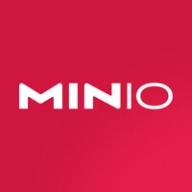

![SwiftStack [EOL] Logo](https://images.peerspot.com/image/upload/c_scale,dpr_3.0,f_auto,q_100,w_64/rCrJ5QMmvucDdhnMyyNUFbAd.jpeg?_a=BACAGSGT)
Find out what your peers are saying about Red Hat, Dell Technologies, Nutanix and others in File and Object Storage.


| Company Size | Count |
|---|---|
| Small Business | 11 |
| Midsize Enterprise | 11 |
| Large Enterprise | 21 |
| Company Size | Count |
|---|---|
| Small Business | 11 |
| Midsize Enterprise | 4 |
| Large Enterprise | 9 |
| Company Size | Count |
|---|---|
| Small Business | 3 |
| Midsize Enterprise | 2 |
| Large Enterprise | 3 |
FlashBlade is the industry’s most advanced scale-out storage for unstructured data, powered by a modern, massively parallel architecture to consolidate complex data silos (like backup appliances and data lakes) and accelerate tomorrow’s discoveries and insights.
MinIO is an open-source object storage system. It is designed to efficiently store and retrieve unstructured data, such as photos, videos, and backups. MinIO can be used as a standalone object storage server or as part of a larger system, such as a data lake or a private cloud, and can be deployed on-premise, in the cloud, or in a hybrid environment, making it a flexible storage solution for a variety of use cases.
MinIO’s features include erasure coding, bitrot protection, and checksum validation, which help ensure data integrity and reliability. The solution’s multi-tenancy support makes it ideal for multi-user environments. MinIO’s edge computing tools enable data storage and processing closer to users' locations, reducing latency and improving performance. MinIO can easily scale to accommodate storage and power demands, making it ideal for use in large-scale, data-intensive environments.
MinIO Benefits and Features:
MinIO offers several key benefits and features for organizations looking for a scalable and high-performing object storage solution:
Reviews from Real Users
MinIO stands out among its competitors for a number of reasons. Several major ones are its flexibility, integration options, and performance.
Süleyman Fazıl Y., a senior software engineer at a tech services company, writes, “The most valuable features are that MinIO is open, it works on-premise, and is compatible with the Amazon industry which is great for finding compatible libraries in many languages which is very good for developers.”
Rebecca S., CTO at NIASE, says, “MinIO is much improved over the prior solution, updates are simple to apply, and we anticipate that future capacity requirements will be easier to meet. Our customers are using this solution to retrieve tens of thousands of objects (documents and files) per hour, and MinIO seems to be able to keep up with it.”
SwiftStack [EOL] offers robust cloud integration, rapid deployment, and hardware-agnostic capabilities, making it a preferred choice for organizations needing scalable and flexible storage solutions. It supports a variety of storage needs from object storage to enterprise-grade backup systems.
SwiftStack [EOL] is recognized for its seamless cloud integration and platform independence, enabling rapid deployment and superior scalability. Its metadata search, proxyFS, and 1space feature enhance versatility and backup efficiency. SwiftStack Controller provides an enhanced management experience with easy system upgrades and performance monitoring. While the management UI and ProxyFS maturity have room for improvement, users seek more organized interfaces and better REST API support. Enhancements in erasure coding configurations and data archiving, along with improved client library integrations, are highlighted needs. The demand for NFS integration improvements and options for data movement between storage policies is noted.
What are the key features of SwiftStack?SwiftStack [EOL] is implemented in industries as a backup platform for Commvault and Veeam, cloud storage similar to Amazon S3 or Azure Blob. It's essential for SaaS platforms, data sharing in research, preproduction object storage, data center operations, and archival management for OpenStack Swift servers in educational and research institutions.
We monitor all File and Object Storage reviews to prevent fraudulent reviews and keep review quality high. We do not post reviews by company employees or direct competitors. We validate each review for authenticity via cross-reference with LinkedIn, and personal follow-up with the reviewer when necessary.